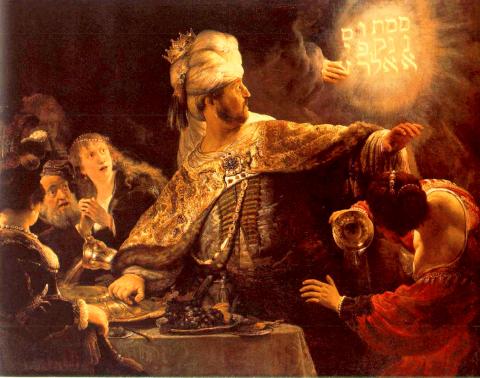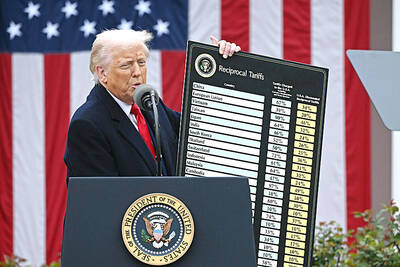Chinese Practice
大難臨頭;大禍臨頭
(da4 nan4 lin2 tou2; da4 huo4 lin2 tou2)

Photo: Wikimedia Commons
照片:維基共享資源
catastrophe looms
愛爾蘭作家強納森‧史威夫特在他一七二○年的詩〈The Run Upon the Bankers〉(遇到銀行家)中,描述一位銀行家了解到,他的墮落是他自己的行為所造成的,詩句如下:
被誘惑的銀行家如此絕望,
從他的手裡,就能預知他未來的敗相;
誰掌握了他的債券,誰就掌握了他的命運;
如同寫在牆上的字一樣。
這最後一行「‘Tis like the Writing on the Wall」(如同寫在牆上的字一樣)是什麼意思?史威夫特此詩中,其實並無牆壁,也沒有人在上面寫字。「writing on the wall」純粹是隱喻性的,這是暗指《聖經》〈但以理書〉中關於伯沙撒王之死的經文。
歷史上的伯沙撒,是代替其父納波尼德行使職權的攝政王,他是新巴比倫帝國最後一位國王,一般認為他是在公元前五三九年波斯人打敗巴比倫時被殺。與歷史上所記載的伯沙撒不同,聖經中關於伯沙撒之死的記載是從一場盛宴說起,在這盛宴中伯沙撒將聖殿中用來敬神的器皿拿來當酒杯用,褻瀆了神;眾人酒酣耳熱之際,一隻手忽然憑空出現,在宮殿牆上寫下阿拉姆語文字「mene mene tekel upharsin」,酒醉的狂歡嘎然而止。驚惶的伯沙撒知道這幾個詞的字面意義──「為數有限、稱重量、分裂」──但對其真正的含義卻是困惑不解,因此伯沙撒召見了以解夢著稱的流亡猶太人但以理。但以理看出來這句話是個預兆,預示了伯沙撒的滅亡,而最後一個字則是在影射波斯。據聖經故事記載(新英文版聖經〈但以理書〉第五章),但以理對這句話的解釋為:
「Mene(彌尼):就是上帝已經數算你國的年日到此完畢。
Teke(提客勒):你被稱在天平裏,顯出你的虧欠。
Peres(毗勒斯):你的國分裂,歸與米底亞人和波斯人。」(和合本聖經中譯)
據聖經〈但以理書〉第五章第三十節所載,伯沙撒就在當夜被殺了。
我們今天所說的「the writing is on the wall」,其意為顯示事物大限將至的種種跡象。
在中文裡,若要表達災難已近,我們可以說「大難臨頭」或「大禍臨頭」。 這成語來自戰國時期的道家經典《莊子》外篇的〈秋水〉。此處談到孔子在當時賢者不受重視的情況下,沒有機會為執政者提供建言,但孔子對此已逐漸釋懷。他說道:「白刃交於前,視死若生者,烈士之勇也;知窮之有命,知通之有時,臨大難而不懼者,聖人之勇也。」(尖刀架在面前,不把死亡當做一回事,這是烈士的勇氣;知道窮困是命運,知道通達需要時機,面臨到大災難而不會有所畏懼的,是聖人的勇氣。)
(台北時報林俐凱譯)
雖然遭到這些打擊,他們夫妻倆不但沒有大難臨頭各自飛,反而一起努力,突破了困境。
(Despite the blows that life dealt them, the couple did not go their separate ways, and decided instead to push on and overcome their difficulties together.)
你大禍臨頭了,還醉生夢死,完全沒有危機意識。
(You’re heading for disaster, and yet you’re being a total hedonist: You have no idea what’s you’ve got coming to you.)
英文練習
writing on the wall
In his 1720 poem The Run Upon the Bankers, the Irish writer Jonathan Swift refers to a banker who understands that his fall is the result of his own actions, with the verse:
A baited Banker thus desponds,
From his own Hand foresees his Fall;
They have his Soul who have his Bonds;
‘Tis like the Writing on the Wall.
What did Swift mean by that last line? In Swift’s poem, there was no actual wall, and nobody had written on it. The “writing on the wall” is purely metaphorical, an allusion to a Bible verse found in the Book of Daniel concerning the death of Belshazzar.
The historical Belshazzar was regent to his father, Nabonidus, the last king of the Neo-Babylonian Empire. He is thought to have been killed when the Persians defeated Babylon in 539 BC. The Bible version of Belshazzar’s end differs with the historical account, and starts with a magnificent feast during which Belshazzar insulted God by using sacred temple vessels as wine goblets. The drunken revelry was abruptly halted when a disembodied hand appeared out of thin air and wrote the Aramaic words mene mene tekel upharsin on the palace wall. The shaken Belshazzar understood the literal meaning of the words — “numbered, weighed, divided” — but was confused as to their significance. He called Daniel, a Jewish exile with a reputation for interpreting dreams. Daniel believed the phrase to be an omen signaling Belshazzar’s fall, and the final word as an allusion to Persia. According to the Bible story (Daniel 5: New English Version), Daniel interpreted the phrase to mean:
“Mene: God has numbered the days of your reign and brought it to an end.
Tekel: You have been weighed on the scales and found wanting.
Peres: Your kingdom is divided and given to the Medes and Persians.”
According to Daniel 5:30, Belshazzar was slain that same night.
When we say “the writing is on the wall” today, we mean that all the indications are that the end to an endeavor is close.
In Chinese, when we want to say that catastrophe is near, we can use either 大難臨頭 or 大禍臨頭. This idiom derives from the ancient Warring States period Taoist classic, the zhuangzi, from the qiu shui (Floods of Autumn) chapter in the Outer Chapters section. Here, the writer has Confucius remark on how he has come to terms with not being able to offer sagely advice to a ruler in a time when such services are undervalued. He says 白刃交於前,視死若生者,烈士之勇也;知窮之有命,知通之有時,臨大難而不懼者,聖人之勇也 (When men see the sharp weapons crossed before them, and look on death as going home, that is the courage of the determined soldier. When he knows that his lot is determined for him, and that his employment by a ruler depends on the character of the time, and then meeting with great distress is yet not afraid, that is the courage of the sagely man.”
(Paul Cooper, Taipei Times)
I’m afraid the writing’s on the wall. I don’t think we can avoid bankruptcy at this stage.
(我們恐怕是大禍臨頭了,我不認為我們到這個地步可以躲得過破產的命運。)
Mel and Jim are always at each other’s throats. The writing’s on the wall for them, I think.
(梅兒和吉姆總是吵個不停,我想他們之間的關係很快就會完了。)

A: Although the scandalous Eastern superstar Kim Soo-hyun canceled his visit, Western superstar Andrea Bocelli is visiting Taiwan over the long weekend. B: Yup, the blind tenor will become the first Western artist to hold a concert at the Taipei Dome tonight. A: Pop diva Celine Dion even praised him: “If god would have a singing voice, he would sound a lot like Andrea Bocelli.” B: I love their duet, “The Prayer.” I even played the song at my sister’s wedding for the newlyweds. A: Two Taiwanese singers, A-mei and A-lin, sang with Bocelli before. It would be great

The Federal Communications Commission (FCC) has announced new regulations requiring that all mobile phones sold in the United States be compatible with hearing aids. These rules aim to expand the range of options available to individuals with hearing loss, enabling them to choose devices that best suit their needs. The new plan includes requirements for universal Bluetooth connectivity. This means mobile phone manufacturers cannot limit their phones to interact only with specific devices. The rules also establish volume control standards to guarantee clear audio for hearing aid users. This will allow them to increase the volume without distortion. The

US President Donald Trump is taking a blowtorch to the rules that have governed world trade for decades. The “reciprocal’’ tariffs that he announced Wednesday last week are likely to create chaos for global businesses and conflict with America’s allies and adversaries alike. Since the 1960s, tariffs — or import taxes — have emerged from negotiations between dozens of countries. Trump wants to seize the process. “Obviously, it disrupts the way that things have been done for a very long time,’’ said Richard Mojica, a trade attorney at Miller & Chevalier. “Trump is throwing that out the window ... Clearly this is

Dos & Don’ts — 想想看,這句話英語該怎麼說? 1. 我臥病三天。 ✔ I stayed in bed for three days. ✔ I kept to my bed for three days. χ I slept in my bed for three days. 註︰動詞 sleep 通常作「睡眠」解。例如:Usually we sleep eight hours a day. 「因病臥床」應用 to stay in bed 或 to keep to one’s bed. 2. 彼得容易傷風。 ✔ Peter is liable to colds (或to catch cold). ✔ Peter is subject to colds. χ Peter is easy to catch cold. 註︰easy 常用於事,可以說 English is easy to learn. 或 It is easy to learn English.,但不可以說 I am easy to learn English.。因為 easy 很少用於人,尤其用來指「容易」的場合。除非用在 an easy person 中,easy 在此意思是「隨和」。 另外,可以說 “It is easy to misuse the article.”